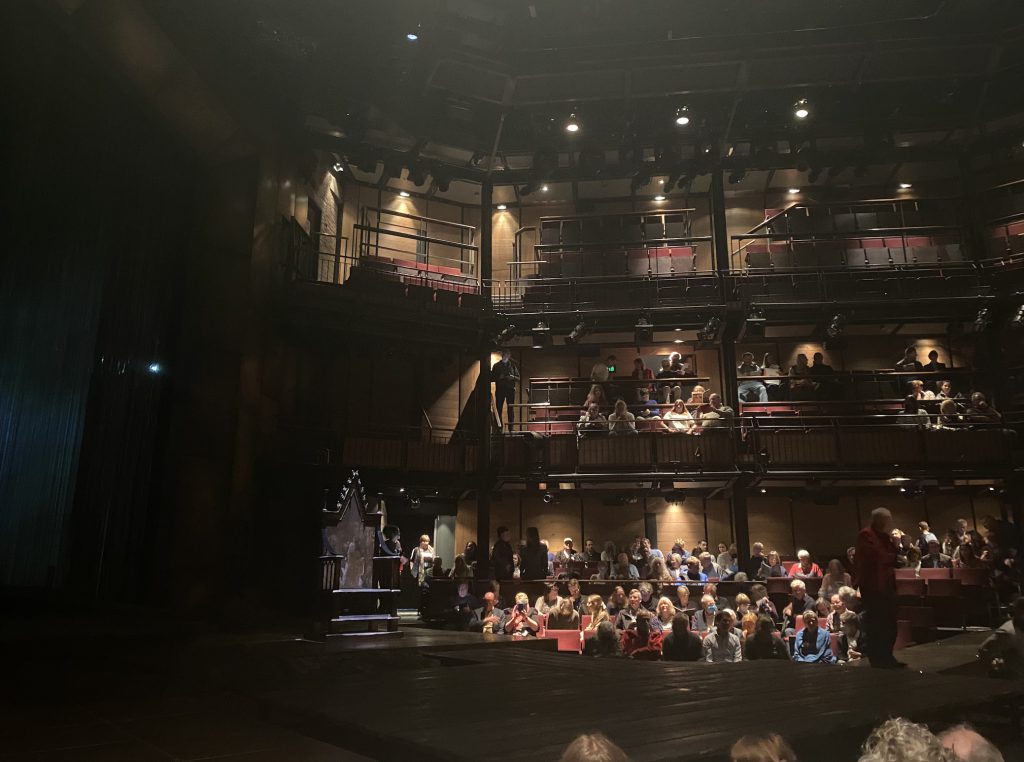“Those who don’t know their history are doomed to repeat it.”
– Kevin Petersen, and many others
Professor Petersen repeated these words to us as we waited on the platform for our train to Stratford-upon-Avon, and at the time, I didn’t know how much they would resonate with me in the following days. I have heard these words before, read them, spoke them even, but I doubt I have ever given them the same level of thought as I did after seeing The War of the Roses.

I’ll admit that I didn’t know much about Shakespeare’s Henry VI prior to our viewing of the play, nor did I know much about the history in general. Of course, I still had some moments of confusion during the play, but the premise and overall message was clear. While each actor gave a phenomenal performance and though there were many aspects of the play that inspired deeper questions, none struck me quite as much as the performance of Minnie Gale as Queen Margaret, particularly what action her character takes throughout the play.
For those of you who haven’t seen the play, Margaret becomes enraged upon hearing that Henry will relinquish the crown and throne to the Duke of York after his death, robbing his own son of the opportunity to rule (which is his birthright). In Henry’s name, Margaret takes to battle, fighting with a level of ferocity that only a parent can display. Margaret engages in vicious bloodshed, which peaks when she orders the murder of one of the Duke’s children (warning: next sentence will be upsetting for viewers). She later uses a rag soaked in the child’s blood to taunt the Duke before she orders his execution, telling him to use it to wipe his tears. Towards the end of the play, Margaret and her child are captured, and the child is killed while Margaret watches. To increase her suffering, Margaret is kept alive. I do not know what happens to her after, but I do know that she remains alive long enough to see the atrocities of Richard III.
Margaret’s character and her actions have haunted me since the performance, especially when viewed in conjunction with the quote from Professor Petersen. While many (including myself) can say that Margaret’s rage is justified, what she does with her rage is jarring. One of the most important pieces of learning, academically or otherwise, is taking your experiences and growing from them. What you do with the obstacles thrown your way is what shapes your history. How you act and react shapes not just your history, but the history of others as well. Margaret was presented with a threat/injustice to both herself and her child, and chose a path of violence to eliminate the threat. If we take a look back at history to every person who chose the path of violence when they believed they were wronged, we would see some of our most heinous villains. We would see figures who have committed war crimes, mass atrocities, people who have destroyed entire cultures and civilizations in the name of their own motives.
As I said before, it’s what we do with our experiences that shapes our history. In The War of the Roses, Margaret became the very thing she feared in the first place. In her fight to protect her family, she lost everything- and was kept alive to watch the cycle repeat itself under Richard III’s reign. Even now, four days later, I can’t help but find myself thinking of the implications of the play’s message. It was a phenomenal experience, and I would definitely recommend seeing it if you have the chance.
